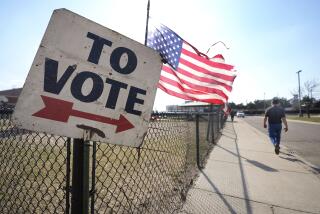Many War-Wearied Algerians Not Interested in Voting
- Share via
ALGIERS — Millions sat out Algeria’s first local elections in seven years Thursday, and many who did vote voiced skepticism at the authorities’ claim that democracy is having a rebirth in this country awash in the blood of an insurgency by Islamic terrorists.
For many Algerians, traumatized by six years of savagery--including the recent slaughter and mutilation of hundreds of men, women and children on the doorstep of this capital city--the call to elect 15,000 mayors and local and provincial council members seemed irrelevant.
“We don’t vote. We don’t want to vote. We don’t care about all that,” said Sofiane, a jobless young man leaning against a wall near a high school polling station in Algiers’ Telemly quarter.
“All those promises,” said a leather-jacketed companion, Samir Naini, 24, “and the government gave us nothing.”
Turnout figures were not available when polls closed at 8 p.m. Thursday, but it appeared that the participation would be on a par with or slightly lower than votes for higher offices held in recent years. Results were expected to be released as early as today.
Although the now-banned Islamic Salvation Front, or FIS, had urged a boycott, several analysts said the stay-at-homes more likely were attributable to fatigue and numbness among the electorate.
It was the fourth time since 1995 that they were called on to vote in elections that President Liamine Zeroual has portrayed as a step-by-step restoration of democratic institutions that will ultimately marginalize and deflate the violent extremists who are bent on creating a state ruled by Islamic law.
Since 1995, Algerians have voted for a president, a constitution, a parliament and now local governments.
“Algeria is living today an historic event,” Zeroual said after casting his ballot Thursday. He called the elections a key element of “overall measures toward the definitive exit from the crisis.”
But since each previous vote has been followed by seemingly ever more ghastly carnage, voters said Thursday that hopes have been sapped. Those who came to the polls often used the word “duty” to explain their presence, but few seemed able to summon any genuine enthusiasm for the enterprise.
Lalia, a 28-year-old announcer for state radio who said she feared for her position if identified by full name, had her own measure of the increasing mood of despondency.
She recounted that she was able to round up six friends to come with her to vote in the presidential poll in 1995, but only four were willing when the elections for a parliament took place last June. On Thursday, only one friend was still willing to join her.
“We have lost a lot of faith in all their programs,” she said of politicians. But she persists in voting because, she said, she is “just an optimist.”
Lalia conceded that things cannot get much worse. More than 65,000 people have died during the unrest that followed the military’s annulment of elections in January 1992 that the FIS had been poised to win. Among the victims were at least nine candidates for local offices around the country who were assassinated in the weeks just before Thursday’s voting.
The generals who took over in 1992 faced demonstrations that evolved into guerrilla warfare and widespread terror. At first, the violence was aimed at certain groups: members of the armed forces, journalists, academics. But in recent years, it has degenerated into headline-grabbing massacres of whole communities.
Recent bloody rampages in the Algiers suburbs of Sidi Rais and Bentalha, blamed on the Armed Islamic Group, an FIS splinter organization, seemed to have hardened attitudes against the militants among members of the public while galvanizing the army to work harder to dig the attackers out of mountain bases just south of the capital.
The voting in Telemly--a former French colonial district of charming early 20th century apartment buildings--reflected the mixed mood in this country of 28.6 million people.
Voters trooped into the polls at the high school under the scrutiny of dozens of police officers. Several of the voters said they had come hoping that the elections would help save them and their families from the extremists.
“Our hearts are filled with terror. We are afraid that the younger generation will be exterminated,” lamented Louize Rahabi, a Berber matriarch who put her age at 90.
“I came here to vote for the well-being of Algeria,” she declared.
At stake in the elections were more than 1,500 municipal councils and 48 provincial authorities. More than 84,000 candidates from 37 parties and groups vied for about 15,000 positions.
The last local elections occurred in 1990, when Algeria--a formerly one-party state--began to experiment with multi-party democracy. The FIS was the principal opposition and won that vote overwhelmingly. However, those local councils were dissolved when the FIS was declared illegal in 1992.
The municipal councils elected Thursday are to choose two-thirds of a new upper chamber in the parliament that will be called the Council of the Nation.
The president is to appoint the remaining third of the council’s members.
The pro-Zeroual National Democratic Rally was touted to win the elections, just as it won the parliamentary vote in June.
More to Read
Sign up for Essential California
The most important California stories and recommendations in your inbox every morning.
You may occasionally receive promotional content from the Los Angeles Times.










